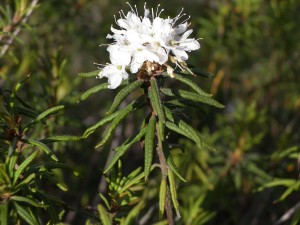Ledum Palustre is a flowering plant that grows in North America, as well as in Greenland, Canada, and Alaska, in Europe in the northern and central parts, and in Asia south to northern China, Korea and Japan.
Contents
Uses
- Ledum Palustre is used in herbalism to make an herbal tea called “Labrador tea”. Some schools of homeopathy consider Ledum Palustre to be a specific remedy for puncture wounds produced by sharp-pointed objects or bites.
- Ledum Palustre tea has traditionally been used as a gruit in brewing beer in the Middle Ages. Due to its strong fragrance, it has also formerly been used as a natural anti-moth (for Clothing Moth) in Scandinavia.
Benefits
-
Cuts and Wounds:
Ledum tends to work best as a homeopathic remedy for cuts and wounds that may become easily infected. This would include puncture type wounds, insect stings, and deep scratches.
Ledum works not only to help the body naturally defend itself against infection, but also to relieve the pain associated with these wounds. Additionally, it is helps diminish bruising, any skin discoloration and swelling that results from the injury as well.
- Eye Injuries:Ledum can be helpful to a black eye that is slow to heal. It can also work quite well for any sort of bleeding that may occur in the chamber of the eye, particularly after some sort of procedure or disruption to the area. Again, it will decrease swelling to the affected area. Ledum is recommended after an iridectomy where part of the iris is removed.
- Stiff and Painful Joints:When there is rheumatic pain such as great pain in the feet or other joints, ledum can work well as a homeopathic remedy. The pain usually starts in the feet and has an upward tendency. Ledum is also is used to alleviate gout, and swollen or stiff tendons. Ledum can help to relieve not only the pain, but the cold feeling that goes along with these conditions.
Cautions
Interactions
- Sedative medications (CNS depressants) interacts with MARSH TEA
Marsh tea might cause sleepiness and drowsiness. Medications that cause sleepiness are called sedatives. Taking marsh tea along with sedative medications might cause too much sleepiness.
Some sedative medications include clonazepam (Klonopin), lorazepam (Ativan), phenobarbital (Donnatal), zolpidem (Ambien), and others.
Other names
James’ Tea, Lède des Marais, Ledi Palustris Herba, Lédon des Marais, Marsh tea, Ledum Silvestre, Marsh Citrus, Moth Herb, Petit Thé du Labrador, Rhododendron palustre, Rhododendron tomentosum var. tomentosum, Romarin Sauvage, Romero Silvestre, Sumpfporst, Swamp Tea, Te de Los Pantanos, Wild Rosemary
References
Source: Home Remedy Central, http://www.homeremedycentral.com/en/homeopathic-remedies/homeopathy/ledum.html
Wikipedia, https://en.wikipedia.org/wiki/Rhododendron_tomentosum

